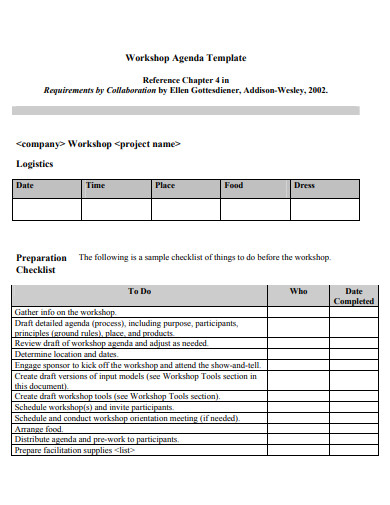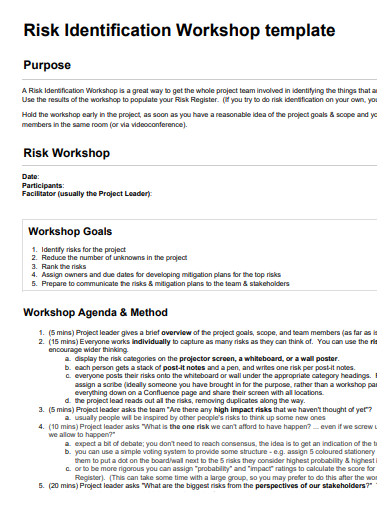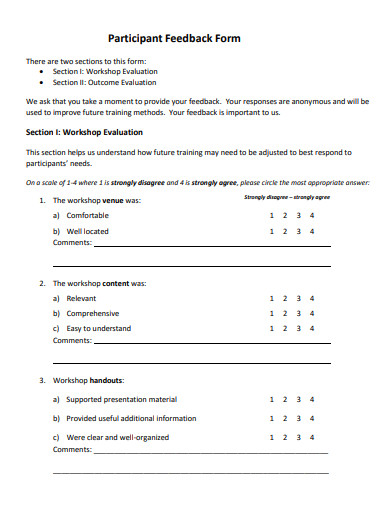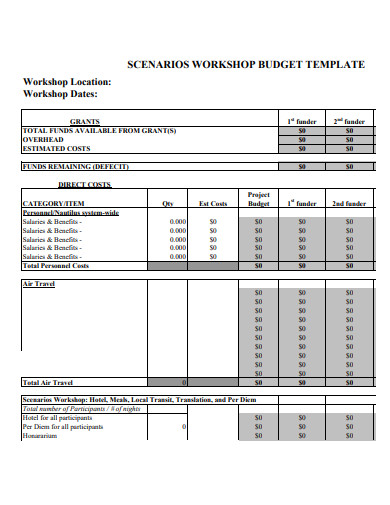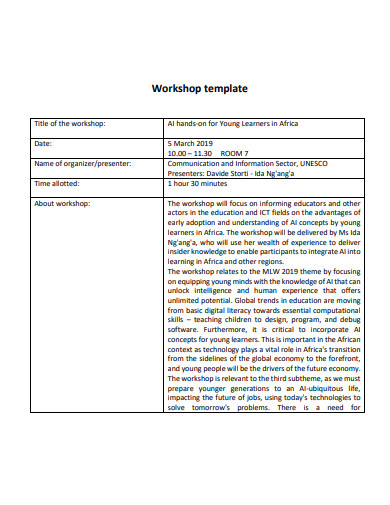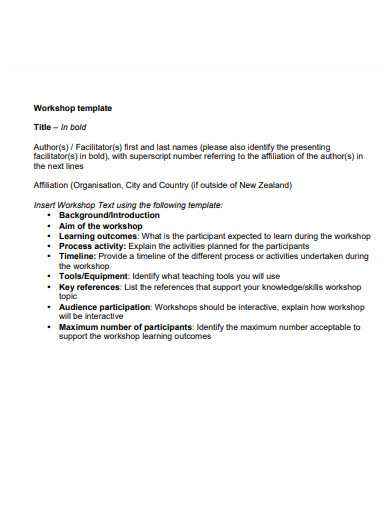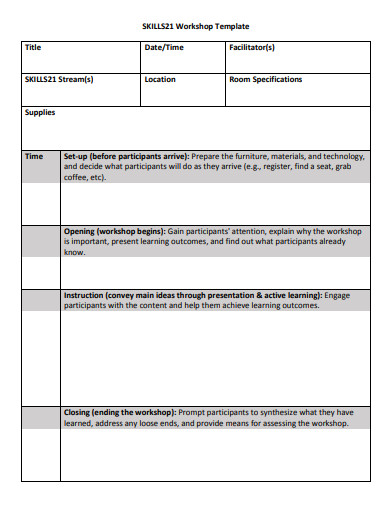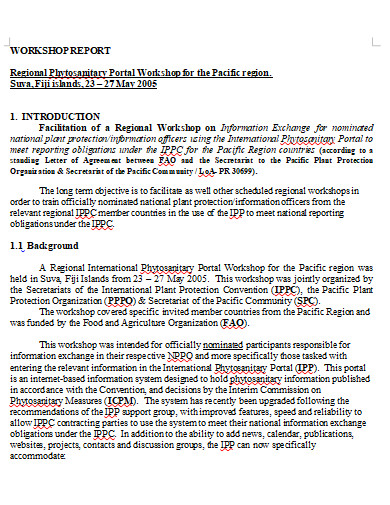Anyone who has ever organized a workshop will tell you that it is a huge undertaking. And are you anticipating a good one? That requires structure, dedication, and a great deal of imagination. So, how can you plan a workshop that is not just informative and productive, but also memorable? Some people despise attending workshops. When done incorrectly, they can be a significant waste of time and money. However, if well arranged, they can be extremely beneficial to all those involved. Workshops are excellent for brainstorming, participatory learning, relationship development, and lateral thinking. This is why forethought is essential.
10+ Workshop Samples
A workshop is an extended interactive meeting or instructional session with the goal of producing a specific output. Workshops are longer than ordinary business meetings and necessitate more planning ahead of time. Workshops are often led by a central trainer or facilitator who collaborates with a group of sponsors to create the order of presentations, organize collaborative activities, and guarantee that the workshop achieves the desired outcome. Hands-on contact is emphasized in workshops. One or more planning workshops are frequently included in strategic planning. Workshops can be used for kickoffs, team chartering, requirement specification, product innovation, value stream mapping, and other sessions with substantial collaborative outcomes.
1. Workshop Proposal
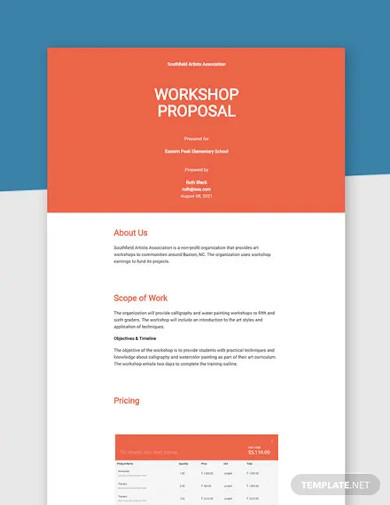
2. Workshop Planning Checklist
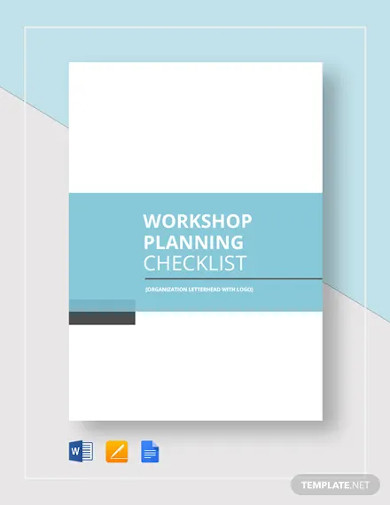
3. Workshop Training Proposal
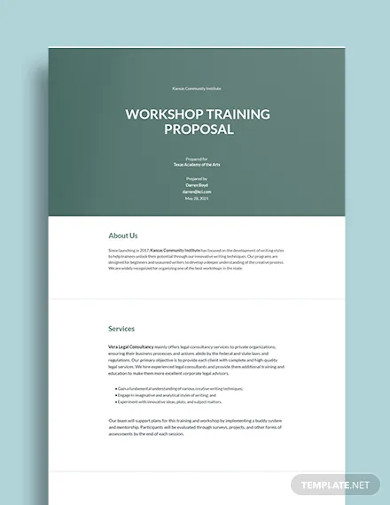
4. Workshop Agenda
5. Risk Identification Workshop
6. Workshop Feedback Form
7. Workshop Budget Template
8. Sample Workshop
9. Simple Workshop
10. Workshop Example
11. Printable Workshop
Before Conducting a Workshop
Follow these measures to ensure that your workshop is a worthwhile experience for all participants:
Define the goals
A objective must be established for each workshop. Do your company’s hiring practices need to be improved? Do you wish to teach managers how to organize better? Do you have to do team building exercises with a newly established team? Many workshops are a pointless exercise because no defined aim is kept at the forefront of the conversation. There’s little purpose in gathering people if there’s no clear goal in mind.
Decide who will attend
Understanding who will attend is closely related to your goal. For example, if the purpose of your workshop is to develop a thorough solution to an issue, you should generally have 10 or fewer important guests. If your purpose is education, you might be satisfied with a much larger group that divides into smaller groups for debate. Make a list of who must attend. Try to be as precise as possible, but leave some room for last-minute changes.
Choose the right location
If you only have ten people, the conference room down the hall will probably be sufficient. However, if you have 50 guests, you may need to find a large enough outside site. When deciding on a location for your workshop, consider the logistics and practical elements. Will your visual aids be visible to everyone? Will the location support a specific technology, such as teleconferencing? Is there adequate space for breakout sessions? Will everyone be able to make it to the event? Will you have to arrange for guests who have traveled a long distance to stay with you? And what kind of catering services does the venue offer?
Create an agenda
Now that you’ve determined your major goal and who will participate, you can begin to plan out how you’ll attain the workshop’s objective.
Develop a follow-up plan
The only way to confirm if your workshop was a success is to have a solid follow-up plan in place. Design a questionnaire to provide to all attendees at the end of the event, and provide numerous opportunities for them to offer their thoughts on how well the event went. Although it can be frightening, this is the only method to progress – and improve – for the next time. It’s also critical to have a plan in place for communicating the workshop’s decisions. Individuals need to understand that their hard work culminated in a course of action, so keep them updated on what’s going on after the workshop.
FAQs
What could be one of the effective tips you can apply when conducting a workshop?
If the purpose of your workshop is to cover a tough or sensitive issue, it’s extremely crucial to make the group feel at ease before you begin. One approach is to share a narrative that is only vaguely related to the topic before delving into the challenging problem.
What is the importance of a workshop?
With a self-paced workshop, you may expand your skill set and pursue your passion. Every workshop reduces the process of learning an entire skill down into a series of simple modules that you can finish entirely at your own leisure.
There’s no denying that organizing a fantastic workshop is a lot of work. However, if you take the time to think through the specifics, everyone will get the most out of the event. The purpose of the workshop should be at the heart of all your preparations. Creative activities will ease and involve everyone, and don’t forget to follow up afterwards: it can be scary to find out what people seriously believed of all your work and effort, but that’s the only way to better your next event.
Related Posts
FREE 10+ Social Media and Analytics Samples in PDF | MS Word
FREE 10+ IOU Samples in PDF | DOC
FREE 10+ Dog Tag Samples in PDF | MS Word
FREE 5+ User Stories Samples in PDF
FREE 10+ Student Artist Statement Samples [ Personal, Approval, Originality ]
FREE 10+ University Personal Statement Samples [ Business, Job, Structure ]
FREE 10+ Health Insurance Exchange Notice Samples in PDF | DOC
FREE 10+ Restaurant Income Statement Samples [ Proforma, Monthly, Projected ]
FREE 10+ Customer Fact Sheet Samples in PDF | DOC
FREE 10+ Stop Direct Deposit Form Samples [ Cancel, Unemployment, Authorization ]
FREE 10+ Business Purpose Statement Sample [ Small, Roundtable, Continuity ]
FREE 10+ Social Media Audit Samples in PDF | MS Word
FREE 5+ Information Security Proposal Samples [ Project, Awareness, Request ]
FREE 5+ Job Interview Assessment Samples in PDF | DOC
FREE 10+ Evaluation Scope of Work Samples in PDF

